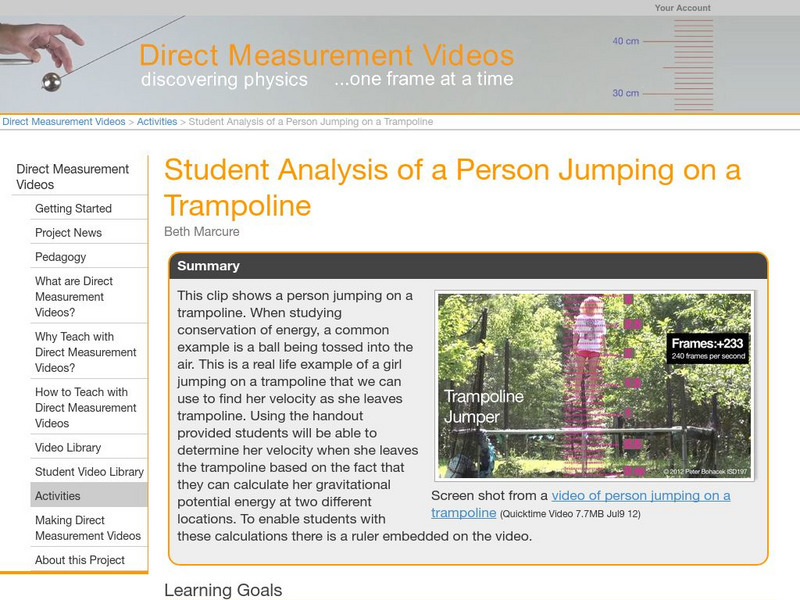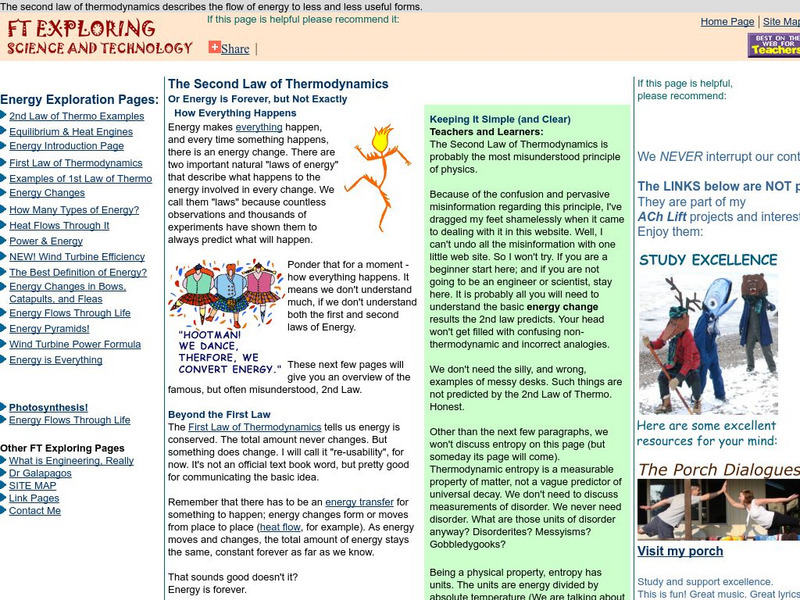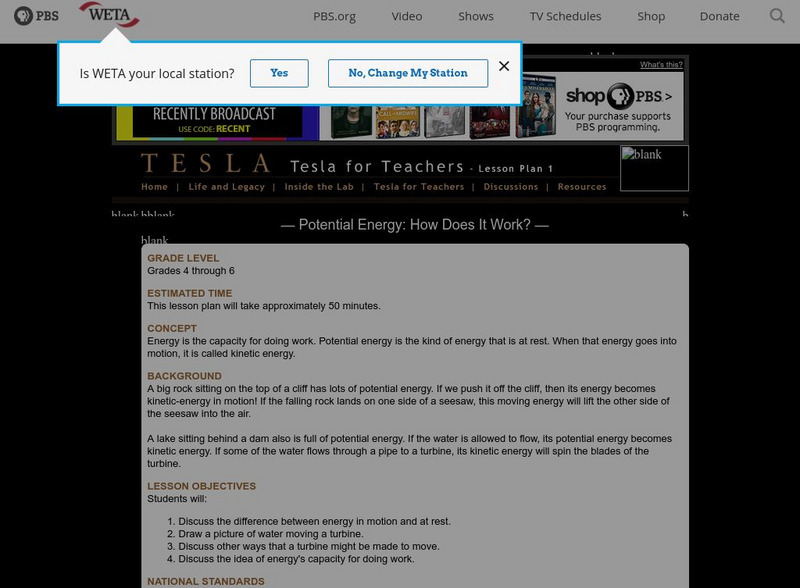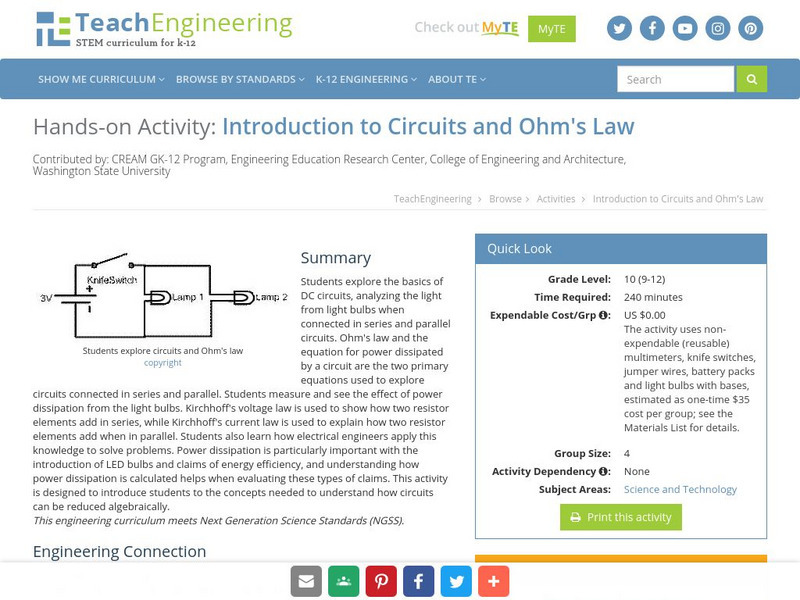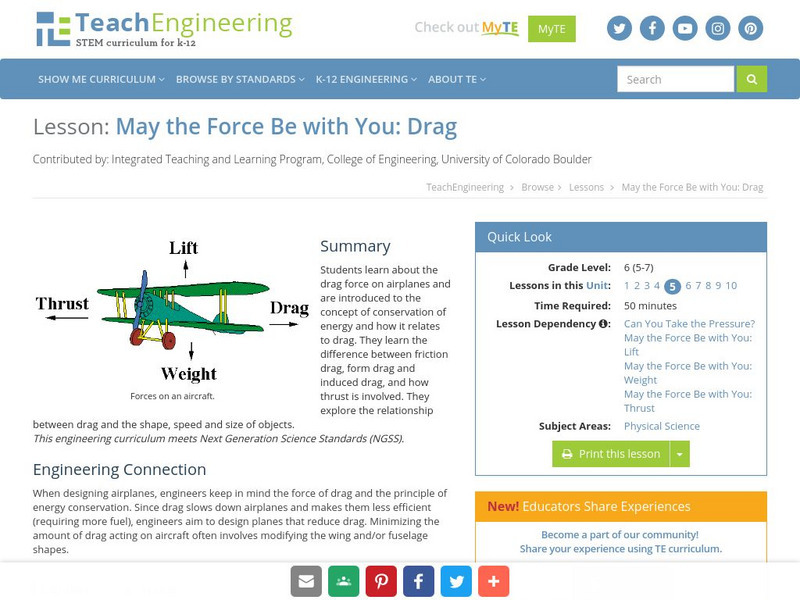Physics Classroom
The Physics Classroom: Work and Energy: Energy Transformation for a Dart
Consider an ordinary dart projected from a toy dart gun and moving through the air. Students analyze work and energy of the motion of the dart with this animation.
Physics Classroom
The Physics Classroom: Work, Energy, and Power: Application/practice Questions
Through illustrated examples and practice problems, students apply the relationship between work and mechanical energy change to a variety of motion scenarios in order to test our understanding.
US Environmental Protection Agency
Epa: Conservation
Official site with information and resources relating to all aspects of environmental conservation: data, maps and laws. Specific environmental information by zip code provides immediate relevance to your world.
Science Education Resource Center at Carleton College
Serc: Student Analysis of a Person Jumping on a Trampoline
For this activity, learners learn about conservation of mechanical energy as they measure the velocity of a girl jumping on a trampoline using a direct measurement video with an embedded frame counter and ruler.
Texas Education Agency
Texas Gateway: Ap Physics: Conservative Forces and Potential Energy
By the end of this section, you will be able to define conservative force, potential energy, and mechanical energy; explain the potential energy of a spring in terms of its compression when Hooke's law applies; and use the work-energy...
OpenStax
Open Stax: Potential Energy and Conservative Forces
In the following interactive students will define conservative force, potential energy, and mechanical energy. They will explain the potential energy of a spring in terms of its compression when Hooke's Law applies. Students will also...
TeachEngineering
Teach Engineering: How a Hybrid Works
In Lesson 4, young scholars conclude the Research and Revise step of the Legacy Cycle, as they investigate different forms of hybrid engines as well as briefly conclude a look at the different forms of potential energy. Students apply...
University of Colorado
University of Colorado: Ph Et Interactive Simulations: Masses & Springs
Hang various mass weights on spring scales while you adjust the spring stiffness and damping in this online activity. Slow down the action, take it to another planet, or watch the amount of potential, thermal, and kinetic energy.
University of Colorado
University of Colorado: Ph Et Interactive Simulations: The Ramp
Which object takes more energy to push up a ramp: a file cabinet, a refrigerator, a piano, or a sleepy dog? Find out in this ramp simulation when you change the angle of the incline, change the objects, or change the friction on the ramp.
FT Exploring
Ft Exploring: The Second Law of Thermodynamics
Learn about one of the most misunderstood principles of physics, the second law of thermodynamics.
Victorian Web
Victorian Web: Conservation of Energy and Thermodynamics
This site is about the trace of the evolution of historical ideas concerning energy conservation and the laws of thermodynamics.
Physics Aviary
Physics Aviary: Energy Loss Lab
This lab is designed to have students investigate the amount of energy lost by a ball when it bounces. Students will change the starting height of the ball and see how this affects the amount of energy lost and the percent of the...
Physics Aviary
Physics Aviary: Guided Energy Loss Lab
This guided lab is designed to have students investigate the amount of energy lost by a ball when it bounces. This guided activity is meant to be used as a pre-lab for students who will do this lab live. Students will get a certificate...
Georgia State University
Georgia State University: Hyper Physics: First Law of Thermodynamics
At this site from Georgia State University the first law of thermodynamics is stated and explained. The meaning of internal energy and enthalpy is discussed. Equations are given and the importance of a system analysis is discussed.
Estrella Mountain Community College
Online Biology Book: Laws of Thermodynamics
Find out about the first and second laws of thermodynamics, and how they relate to the biology of life.
PBS
Pbs Teachers: Potential Energy: How Does It Work?
Describe the difference between energy in motion and at rest, and demonstrate energy's capacity for doing work. Draw a picture of water moving a turbine, and discuss other ways that a turbine might be made to move.
E-learning for Kids
E Learning for Kids: Science: Mexican Diner: What Is Energy?
Meet Carlos at his Mexican diner, and he will tell all about energy and energy transformations.
TeachEngineering
Teach Engineering: Introduction to Circuits and Ohm's Law
Students will explore the basics of dc circuits analyzing the light from light bulbs when connected in series and parallel circuits. Ohm's Law and the equation for power dissipated by a circuit will be the primary equations used. Using...
NASA
Nasa: Kepler's Second Law
This site from NASA states Kepler's second law of planetary motion and depicts its meaning with an informative diagram. Relates the law to conservation of energy principles and discusses the eccentricity of a satellite's (or a planet's)...
Ducksters
Ducksters: Physics for Kids: Energy
Kids learn about the science behind Energy including its different forms such as chemical, electrical, heat, and gravitational. When is energy considered renewable or nonrenewable?
Other
Laws of Thermodynamics
A page from the Fundamentals of Physical Geography site. Identifies, describes and elaborates upon the first, second, and third laws of thermodynamics.
Open Curriculum
Open Curriculum: Thermodynamics
Students learn about the conservation of energy, aspects that affect energy in a system such as pressure and temperature, and to gain a better understanding of concepts such as entropy.
TeachEngineering
Teach Engineering: May the Force Be With You: Drag
This lesson plan explores the drag force on airplanes. The students will be introduced to the concept of conservation of energy and how it relates to drag. Students will explore the relationship between drag and the shape, speed and size...
Alabama Learning Exchange
Alex: Transform Me! Types of Energy
Students will understand the law of conservation of energy and the transformation of energy from one type to another.




